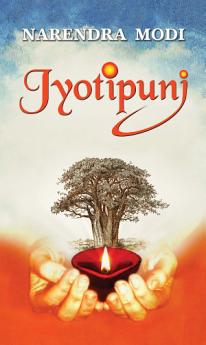Jyotipunj: Jyotipunj: Narendra Modi's Luminous Vision for India
Jan 2015 · Prabhat Prakashan
3.5star
15 reviewsreport
Ebook
264
Pages
reportRatings and reviews aren’t verified Learn More
About this ebook
The life of only those people in the world is purposeful who are able to dedicate a part or whole of their life in others’ good and service. Such great people have made special contribution in constructing the world’s history.
In Bharat; in 1925 Rashtriya Swayamsevak Sangh was established to achieve the exalted goals of nationbuilding and individualbuilding. The work of the Rashtriya Swayamsevak Sangh has been progressing continuously. A large number of people have contributed in taking ahead
this task.
Prime Minister Shri Narendra Modi; a Swayamsevak himself; during his journey for refinement and transformation got an opportunity to come into contact with a number of selfless and devoted people who dedicated every moment of their lives and every particle of their bodies in the service of the Motherland.
Reminiscences of some greatest social workers who relentlessly and untiringly burnt their lives to glow the motherland Maa Bharati.
In Bharat; in 1925 Rashtriya Swayamsevak Sangh was established to achieve the exalted goals of nationbuilding and individualbuilding. The work of the Rashtriya Swayamsevak Sangh has been progressing continuously. A large number of people have contributed in taking ahead
this task.
Prime Minister Shri Narendra Modi; a Swayamsevak himself; during his journey for refinement and transformation got an opportunity to come into contact with a number of selfless and devoted people who dedicated every moment of their lives and every particle of their bodies in the service of the Motherland.
Reminiscences of some greatest social workers who relentlessly and untiringly burnt their lives to glow the motherland Maa Bharati.
Jyotipunj by Narendra Modi: Delve into the lives and contributions of sixteen iconic leaders from Gujarat with this book. It likely provides biographical sketches of these leaders and their impact on the state and the nation. This book offers readers an opportunity to learn about the inspirational figures from Gujarat's history.
Key Aspects of the Book "Jyotipunj":
Biographical Sketches: Learn about the lives and achievements of sixteen notable leaders from Gujarat.
Inspirational Stories: Explore the stories of these leaders and their contributions to society and the nation.
Narendra Modi presents readers with a collection of inspiring biographies in "Jyotipunj." This book pays tribute to the legacy of influential leaders from Gujarat.
Ratings and reviews
3.5
15 reviews
Amruth Rajath
- Flag inappropriate
May 4, 2024
k. L L
About the author
Based on the provided sources, Narendra Modi is the author of this treatise, the Jyotipunj English book, which serves as a respectful tribute to the great tradition of the Rashtriya Swayamsevak Sangh. This Narendra Modi book presents the RSS leaders biographies [e.g., 6, 7, 8, 63, etc.] who acted as architects of Indian society. It explores the lives of dedication sacrifice [1, 11, 16, 17, 19, etc.] and the core principles guiding their actions and Sangh work life. The text highlights significant figures such as Guruji Golvalkar biography [2, 3, etc.], detailing his path and profound Sangh work dedication [75, etc.]. It also covers the foundational role of Dr Hedgewar biography [2, 3, etc.], influenced by Swami Vivekananda inspiration [12, 13, 14, etc.] in pursuing the goal of national welfare India [15, 16, 32, 37, etc.]. The book features other notable individuals like Vakil Saheb Inamdar [63, etc.], known for his patience and perseverance and understanding of organization science; the K Shastri scholar [8, 46, etc.], an example of deep Indian scholarship and a notable figure among Gujarati language experts; Dr Vanikar tribal service [6, 103, etc.], showcasing dedication to Tribal development India; Babubhai Ojha engineer [6, 115, etc.], who prioritized national interest; Madhukar Bhagwat RSS [81, 82, etc.]; Vasantrao RSS work [7, 123, etc.]; Bachubhai Bhagat life [7, 119, etc.]; Nathabhai Sangh leader [7, 108, etc.]; Anantrao Kale Pracharak [7, 85, etc.]; Vasudevrao Sangh work [121, etc.]; and Kashinath Bagwade life [106, etc.]. These accounts illustrate the character of a Sangh Swayamsevak [10, 19, 27, etc.] and contribute to understanding RSS history [implied throughout]. The book touches upon their Indian spiritual paths [3, 20, 21, etc.], connections to Advait Vedanta philosophy, the legacy of Ramakrishna Paramhansa pupils and the Ramakrishna Mission history. It sets these biographies against the backdrop of challenging times including the Indian freedom fighters context and events like the Emergency period India, highlighting the resilience of the organization and its members. The book also notes the link to Jana Sangh politics and the early stages of Bharatiya Janata Party history. A key theme is character building RSS emphasizes and the importance of values and principles book consistently portrays. The organization's self-reliant economic system through Guru Dakshina RSS and the fundamental role of the Sangh Shakha importance are also covered. The author presents these stories to inspire dedication to Hindu society welfare and Nation reconstruction India through selfless humility and service. The book is intended to help readers understand the Rashtriya Swayamsevak Sangh.
Rate this ebook
Tell us what you think.
Reading information
Smartphones and tablets
Install the Google Play Books app for Android and iPad/iPhone. It syncs automatically with your account and allows you to read online or offline wherever you are.
Laptops and computers
You can listen to audiobooks purchased on Google Play using your computer's web browser.
eReaders and other devices
To read on e-ink devices like Kobo eReaders, you'll need to download a file and transfer it to your device. Follow the detailed Help Center instructions to transfer the files to supported eReaders.







